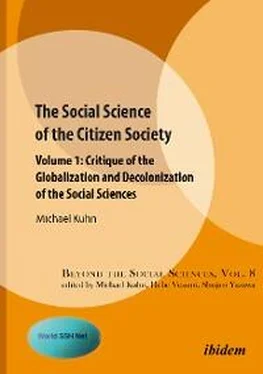Nevertheless, instead of causing any irritation about the explanatory power of social science theories that create such illusory images of the social world, and then instead of therefore examining their theories, the advocates of a de-colonization of social science thinking not only fail to refute the theories of the sciences from the imperial world, but they in turn claim to develop theories that, in their own way, juxtapose equally nationally inspired views of their societies with the theories about the national societies of the imperial countries.
It must be the case that social science thinking, even in these countries, simply does not seem to know how social science knowledge, which is not determined by the view of state definitions of what nation-state societies are, could otherwise be such thinking about the world of state societies. It seems that the nature of social science thinking involves equating thinking about nation-state societies with thinking through the view of the social constructs, primarily through the view of the state itself, of such nation-state societies, and that the only form of this kind of thinking about this world of state societies is thinking as imagining a world of nation-state societies no differently than the mere addition of theories about such social biotopes.
The postcolonial debates, with their contributions and concerns, make these discourses even more paradoxical. If one takes a look at the critical contributions to the debate from the “de-colonized” social sciences, which come from the former colonized countries, then one has to conclude that their word-radical objections, such as those about “scientific power”, about scientific “inequalities”, a “scientific imperialism” and similar objections, are even more paradoxical, that all these critical contributions, for their part, do not always also operate with nationally constructed scientific subjects, be it the idea of a scientific world consisting of a “North” versus a “South”, or of a “local versus global”, or of a Eurocentrism or Occidentalism, all these subjects and objects of their theory-building constructed by the post-colonial debates turn out to be constructions of the same social science-trained thinking of those globalization debates which, as in those debates, consist of an agglomeration of national societies, instead of articulating any doubts about them, that the social science theories about the world of state societies operate with their a priori assumption that they can understand them as biotope societies separated from the world of nation states, in order to reject such theories as obvious false images of imperial world views.
Without even looking at the arguments of the debates about what the de-colonization of the social sciences should be, the categories central to the accusations against “globalized” thinking already show that the opposite is the case: Committed to opposing the newly discovered scientific challenge of that “globalization” of social science thinking with their discourse of de-colonization, these critical objections with their de-colonization debate interpret their objections as a plea for more “local” theories, for a more nationally contoured thinking as congenial contributions from the former colonized countries, and with this strange criticism they claim to be able to participate in the creation and debates about a new global thinking with contributions that are recognized as equal to their own nationally constructed theories about their always nationally constituted societies.
The alternative debate on the “globalization” of the social sciences, which contrasts this with its “de-colonization debate”, does not know how to present this demarcation of the social sciences in the formerly colonized world with its accusation of “Eurocentrism” against the theories from the imperial world in any other way than to liberate its thinking from theories that are first explicitly attributed the explanatory power for European societies, and which then, however, for the explanation of the national societies of the former colonial world demands theories tailored to their national societies, i.e. the principle of viewing the world as individual national societies, which in “globalized” thinking are viewed through nation-state perspectives, does not reject them as a pipe dream or even as errors of the social sciences of the imperial world, but explicitly develops them further, thus confirming this nation-specific view with its critique, which does not want to criticize any of these nationally inspired theories.
But that’s not all: In order to produce their post-colonial social science theories, they themselves, like “globalized” social science thinking, hypostasize not only nationally contoured questions of inquiry in thinking about their societies, decolonized social science thinking, thinking in the former colonized world that would have every reason to do so after its transformation into states, to look at the world of states and their imperialism, because their societies are all too obviously only what they are through the imperial states, the advocates of a de-colonization of social science thinking go one step further towards a nationally predetermined thinking by propagating this thinking as a thinking about nationally contoured objects and research questions, which is supposed to be able to construct its theories only through theoretically exclusive “local” perspectives, “local” views that are only accessible to those who share this exclusive, national view, thanks to their affiliation with these national societies—with the result that this kind of locally exclusive theory production, called indigenous sciences by post-colonial thinking, on nationally preconfigured social phenomena interpreted by nationally biased thinking, with such explicitly nationally inspired theories makes its contribution to that globalized scientific world as a post-colonialized theoretical contribution to theory formation—and thus finally turns this post-colonial thinking into a questionable theoretical matter.
When even renowned masterminds of this de-colonization project from the former colonial states, such as Aimé Césaire in his “Discourse on Colonialism,” 4morally scourge the imperial states for their misdeeds, in order to work their way through this moral condemnation to the most stubborn advocates of the humanistic ideals of the state idea, as if the moral self-portraits of states, which social science thinkers and poets like Césaire like to attach to them, were ever the yardstick for any state policies, then these products of post-colonial thought are certainly among the bleak highlights in the history of social science thought and raise the question of what this decolonized thinking is all about, which is dedicated to the state ideas of those states which, under the title of these state ideals, with their old colonialism and their new imperialism, are responsible for the misery in these states and which, with their wars, ensure the maintenance of their sovereignty over this decolonized part of the world of states.
All these peculiarities of “globalized” and “postcolonial” theorizing in the social sciences are reason enough not only to take a closer look at these debates and to ask what characterizes the theories produced under the maxims of these two postwar debates, but also to raise the question of what is actually the nature of social science thinking, which not only produces such debates, but also discovers the necessity of directing its thinking towards the world only when the world has become a world of states; and that is a thinking that then obviously seems unable to think about the world of state societies in any other way than that in which the world of these state societies, contrary to all everyday experience, is conceived as national biotopes untouched by each other, in order to reflect on these societies thus preconstructed in this “globalized” as well as in “post-colonial” thinking with nationalist perspectives.
Читать дальше












